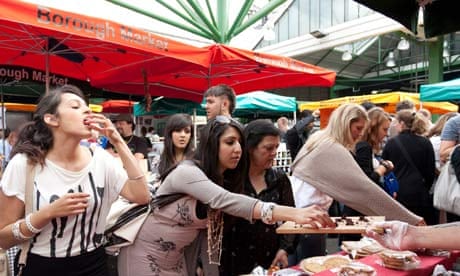Organic raw milk and walnut levain bread, figs from Croatia, chilli sauce from Grenada and foie gras black truffle parfait at £7 for 100 grams: such delicacies are sampled every Saturday by the shoppers and tourists who descend on Borough Market in their thousands. As consumers mingle with camera-toting sightseers, most will leave with the impression that the market on the south side of London Bridge – which dates from at least the 13th century – is vibrant and thriving.
They couldn't be more wrong. Takings are down and fear and resentment are rife in foodie heaven. Relations between traders and the charitable trust that runs the market have sunk to a new low after eight highly respected vendors were abruptly asked to leave last month.
The expulsion has sent jitters through the 120 or so remaining traders. It also raises a larger question over the nature of the market itself. Many traders and local residents fear that it is lurching further away from its roots as a source of high-quality fresh produce, meat and delicacies towards a market as geared towards tourists as Camden Town and Covent Garden.
Last week, one of the expelled traders, Dominic Coyte, co-owner of the Borough Cheese Company, handed in his keys, formally severing a nine-year relationship. Coyte now shares space with a coffee roaster and a bio-dynamic vegetable grower under a railway arch east of London Bridge, where a fledgling market is developing in Maltby Street.
Coyte, 48, is still seething at his treatment and that of his fellow traders at the hands of the trust that runs Borough Market. "To get my comeuppance on the phone and nothing in writing is shameful," he told the Observer. "An organisation that is confident in what it does would not act like that. It's shoddy and underhand."
Peter Wilkinson, chairman of the trust since 2009, insists that Coyte and the others were asked to leave not because they had begun trading at Maltby Street for a few hours a week, but because of disloyalty, in making disparaging remarks about Borough Market, a charge that Coyte strongly denies.
In turn, Coyte accuses Wilkinson and his fellow trustees of pursuing a path that could destroy the market's uniqueness. "They are much more about high-street national chains with a bit of market flavour tacked on," he said. "Peter Wilkinson made his money through railways and property. I don't see a man who understands the slightly scruffy approach of market traders, but someone whose idea of a market is of people standing under tidy umbrellas selling jam in jars with gingham tops."
Herein lies an irony. Wilkinson, whose background is viewed with suspicion by traders, insists that he wants to return Borough Market to its roots as a showcase for artisans making high-quality produce, with an emphasis on quality and provenance.
Once a wholesale market, Borough Market's current incarnation began in the late 1990s, when Neal's Yard, a seller of high-quality British cheeses, sought a damp place for storage. Eventually, people began knocking on the door to buy cheese. As customers kept coming to Neal's Yard, George Nicholson, the trust chairman who oversaw Borough Market's expansion for 11 years until 2006, saw the potential for developing a retail market that would piggyback on the wholesale market.
Others followed, including Konditor & Cook, a high-end baker; Fish!, a restaurant; and Brindisa, a Spanish food shop. Borough Market later became the launch pad for other successful ventures, such as Applebee's, a fishmonger that now doubles as a restaurant. Flour Power City was another success, although it too has been asked to leave on the grounds that it has grown too big.
In a recent interview, Wilkinson said he wanted to shift the balance away from Borough Market's image as a tourist destination, where people come to take pictures rather than shop. While aware that Borough Market is on the tourist trail, near Tower Bridge, HMS Belfast and Tate Modern, Wilkinson says he is adamant that it will not end up like more commercialised markets such as Leadenhall and Spitalfields.
However, critics say there is a gap between rhetoric and reality. Nicholson, who has called on Wilkinson to step down, not only points to the expulsion of Coyte and his fellow traders, but to the departure of other market stalwarts such as Tony Booth, a highly respected vegetable wholesaler. Booth, who is well connected to top chefs and has a loyal clientele, decamped to Maltby Street last year after a demand for £40,000 in back rent, and his customers have followed him. One trader described the move as "vindictive" and typical of the management's imperious approach.
"Borough Market was built on an alliance between the trust and the traders," said Nicholson. "That's how it became so successful. Now the trust says it has the Borough Market brand and it's telling the traders what to do. It has tarnished rather than enhanced the market, at a time when there are a lot of alternative outlets and opportunities."
Be that as it may, the overwhelming sentiment among traders is one of resentment at what they see as high-handed micro-management.
"Wilkinson talks a lot about having a relationship with the traders, but it's by diktat," said one trader. "Borough Market is being chopped and moulded to suit one person's idea of what it should be. But it's not consensual and he's not experienced enough."
The trader spoke on condition of anonymity, fearful of retribution from a management that seems to brook no criticism. More than one spoke of the sense of uncertainty after the recent ructions.
"Nobody's safe," said the trader. "If I felt safe, I wouldn't be talking to you next to a fridge in a dark space at the back of the stall."

Comments (…)
Sign in or create your Guardian account to join the discussion